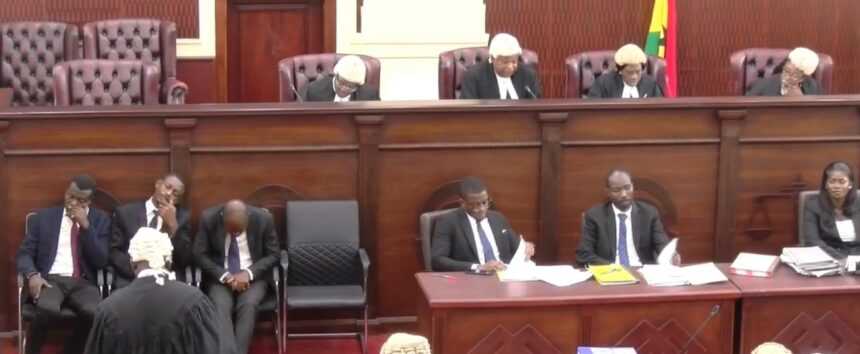adverts
The Supreme Court of Ghana has scheduled Tuesday, November 12, 2024, to deliver a much-anticipated ruling on the disputed decision by Speaker of Parliament Alban Bagbin to declare four parliamentary seats vacant.
The decision stems from a legal challenge led by Alexander Afenyo-Markin, leader of the New Patriotic Party’s (NPP) parliamentary caucus, who disputes the legality of Bagbin’s declaration.
At Monday’s court session, Speaker Bagbin’s counsel, Thaddeus Sory, was notably absent, and a formal statement of case from the Speaker was also not submitted. During prior hearings, the Attorney-General questioned the validity of Sory’s representation, arguing that his appointment lacked the necessary clearance from the Public Procurement Authority.
adverts
The controversy began on October 17, 2024, when Speaker Bagbin declared four parliamentary seats vacant, citing alleged constitutional breaches by the MPs involved.
According to Bagbin, the MPs’ actions violated Article 97(1) of the 1992 Constitution, necessitating their removal.
However, Afenyo-Markin’s suit challenges this interpretation, contending that the Speaker overstepped his authority and circumvented judicial oversight in making such a declaration unilaterally.
A central issue in the case is whether the Speaker has the constitutional authority to interpret and enforce parliamentary vacancies or whether this responsibility rests solely with the judiciary.
Afenyo-Markin argues that the Speaker’s decision bypassed the judicial process and has disenfranchised the affected constituencies, effectively leaving them without representation in Parliament.
The Supreme Court previously issued an injunction, halting any actions on the vacant seats until a final judgement. In response, Speaker Bagbin filed a motion to overturn the injunction, claiming that it impeded his role in maintaining parliamentary standards and integrity.
However, the Court dismissed Bagbin’s request, reiterating its position that the seats should remain vacant until a conclusive ruling is delivered.
The upcoming judgement is expected to clarify the constitutional boundaries of the Speaker’s authority and set a precedent on the interpretation of parliamentary vacancies. Legal analysts and the general public alike are closely watching the case, as the ruling is likely to have a profound impact on the balance of power between the Speaker’s office and the judiciary, potentially reshaping parliamentary protocol in Ghana.


